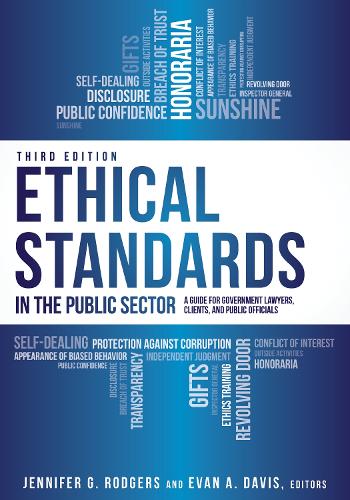
Ethical Standards in the Public Sector: A Guide for Government Lawyers, Clients, and Public Officials, Third Edition
(Paperback)
Publishing Details
Ethical Standards in the Public Sector: A Guide for Government Lawyers, Clients, and Public Officials, Third Edition
By (Author) Jennifer G. Rodgers
Edited by Evan A. Davis
American Bar Association
American Bar Association
28th November 2022
United States
Classifications
General
Non Fiction
Regional government law
Local government law
Government powers
Public procurement, services and supplies
Public Law
174.30973
Physical Properties
Paperback
338
Width 177mm, Height 254mm
Description
This compilation of essays, articles and research provides a clear and concise overview of many of the complexities of public sector ethics, including post-employment restrictions on government employees, whistle-blowing, pro bono work, regulation of honoraria, royalties and travel reimbursements, financial disclosure filing requirements, gift giving, conflicts of interest, and issues in enforcement of local ethics law.
Author Bio
Jennifer G. Rodgers is a lecturer in law at Columbia Law School, an adjunct professorof clinical law at the NYU School of Law, and a legal analyst for CNN. Sheteaches, writes, and speaks all over the world about government ethics, publiccorruption, and sports corruption. Jennifer is a member of both the Task Force onthe Rule of Law and the Federal Courts Committee at the New York City Bar Association,and is the former chair of the associations Government Ethics Committee.She also serves on the Independent Review Panel for Conviction Review for KingsCounty (Brooklyn) District Attorney Eric Gonzalez. From 2013 to 2018, Jenniferwas the executive director of the Center for the Advancement of Public Integrityat Columbia Law School (CAPI), which works to improve the capacity of publicoffices to identify, deter, and combat corruption. Between 2000 and 2013, Jenniferworked at the U.S. Attorneys Office for the Southern District of New York, whereshe served in numerous capacities, including as a deputy chief appellate attorney,the chief of the Organized Crime Unit, and a chief of the General Crimes Unit. Jenniferalso worked as an associate in the litigation department of Cravath, Swaine &Moore LLP, and as a law clerk to former U.S. District Judge Stanley A. Weigel in theNorthern District of California. Jennifer graduated from the University of California,Berkeley School of Law, and the University of California, Los Angeles. Evan A. Davis resides in New York City and is a senior counsel at Cleary GottliebSteen & Hamilton, LLP. He graduated from Columbia Law School in 1969 wherehe was editor in chief of the Columbia Law Review. He clerked for Harold Leventhalon the D.C. Circuit and Potter Stewart on the Supreme Court. Following hisclerkships, he was appointed the first general counsel of the New York City budgetdivision and later made the chief of the Consumer Protection Division in thecitys Law Department. In 1974, he joined the Impeachment Inquiry staff of theU.S. House Judiciary Committee. He practiced law as a Cleary litigation associateand then partner from 1975 to 1985 when he was appointed counsel to GovernorMario Cuomo. He returned to Cleary in 1991 and later served as president of the New York City Bar and vice chair of the Columbia University Trustees. He alsochaired the American Bar Associations Standing Committee on Public Educationand served on the New York State Bars Committee on Standards of Attorney Conductwhen it revised the ethics rules for lawyers. He currently serves as managerof the Committee to Reform the State Constitution, which was initially establishedas a committee to advocate for calling a state constitutional convention. Strengtheningenforcement of the states Code of Ethics has been a continuing priority forthe group.
